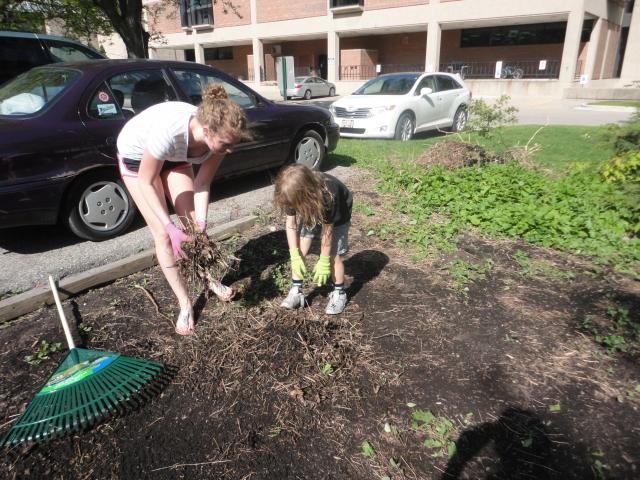







Tucked away in the Greenbush neighborhood, a vibrant community center’s mentoring program is affecting the lives of more of Madison’s children every year.
Neighborhood House is Madison’s oldest community center. The center was established in 1916 as a settlement house for Italian immigrants. Almost a century later, Neighborhood House now serves families across the Madison area through their diverse programs and services, according to Program Director Amanda Ryan.
Ryan began the Collegiate Mentoring Program three years ago to get kids interested in all aspects of college life, from academics to socializing.
“We wanted to teach them that ‘Hey, there’s this thing called college, and it’s really cool,’” Ryan said.
The program pairs students from the UW-Madison and Edgewood College with children ages 7 to 17. The college student acts as a role model and resource for the younger student. Each pair is required to meet twice a week for one hour each day. On one day the college student assists their partner with homework. On the other day the pair signs in at Neighborhood House, and then the fun begins. They spend their hour on field trips to campus or other area attractions, like Henry Vilas Zoo or Memorial Union.
According to the Wisconsin School District Performance Report, in 2012, 63.6 percent of 2012 graduates from Madison planned to attend a university or technical school. The Collegiate Mentoring program aims to boost that number.
The program is gaining popularity as Ryan develops partnerships with Madison schools like Hamilton and Randall. When the program began in 2010, it attracted eight pairs, but has expanded to 33 this school year.
“I didn’t realize it would get so big so quickly... but that just says something about the need for mentoring for kids,” Ryan said.
UW-Madison junior Katie Rogers became involved in the mentoring program in fall 2012 after hearing about the program through Aspiring Nurses Association, a group for UW-Madison students studying to become nurses. Rogers participated in Big Brothers Big Sisters in high school and was excited to find a similar volunteer opportunity at UW-Madison.
“I love kids, so it’s kind of right up my alley,” Rogers said.
Rogers has been working with her current mentee, an eighth-grade girl who shares Rogers’ taste in music and movies, since January 2013. The pair loves being outdoors, science and the color pink. They get along so well, in fact, that they decided to continue their partnership after their year was up.
“You can tell that she looks up to me, and every time that I see her she smiles so big,” Rogers said. “We just laugh a lot, I love her; she’s so cool.”
Rogers spends her Tuesday afternoons helping her mentee with her schoolwork, which she struggled with before starting the program.
On Wednesdays they go on field trips, often joining with another pair. Some of their favorite activities include exploring Henry Vilas Zoo, bowling and rock climbing at Union South, and visiting the Wisconsin Institutes for Discovery. Rogers says she can see a huge difference in her mentee’s social and academic confidence since they met, and that this is what makes the program rewarding for her.
“The satisfaction that I can empower her and change her for the better, and be there for someone and make a difference in their life is just a really good feeling, it just makes me want to go out and do more of it,” Rogers said.
Ryan agrees that the program benefits mentors just as much as mentees. The program helps students considering helping careers decide if they enjoy working with kids and teaches them responsibility. Ryan added that helping a student gain academic self-confidence can be an extremely rewarding experience as well.
“When that light bulb goes on ... it makes the mentor feel really good that they helped them,” Ryan said.
Although the program currently employs mentors than mentees, Ryan hopes to expand the program and take more college students off the waiting list. She began working with teachers at Randall Elementary and Hamilton Middle School last year to recruit more interested children.
“We just want to provide kids with as many resources as we can to do well in school,” Ryan said.
|
|
|
Welcome to the Madison Commons, a website designed to provide news and information about all of Madison's neighborhoods and a crossroads for the discussion of community issues. The name comes from the idea of a village commons, a place for news, talk, debate, and some entertainment, too, that's open to everyone.
All rights reserved. Read more about the Madison Commons and its partners.

